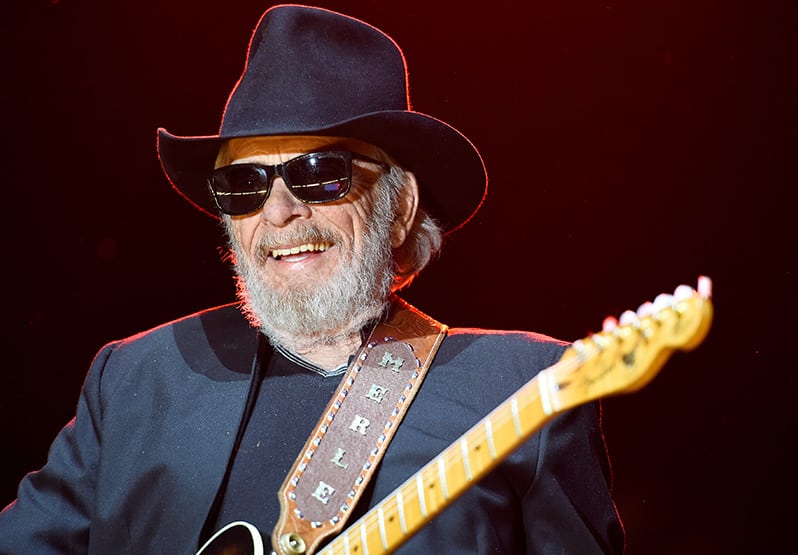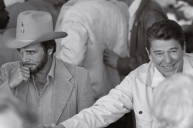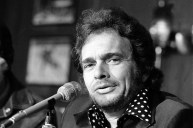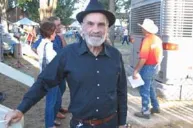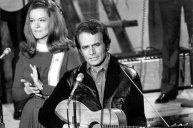It starts with a chugging bass line but pricks your ear when someone plucks at a muted string. There's no mistaking the introduction for Merle Haggard's "Workin' Man Blues." It was the country music star's seventh No. 1 hit on Billboard's Hot Country Singles chart and one of three off of his seventh album with The Strangers, A Portrait of Merle Haggard. (Other notable songs from that outing are "Silver Wings" and "Hungry Eyes.") It's a hard-swinging song that celebrates the frustrations and hard-won moments of relaxation in the life of blue-collar person.
Merle Haggard's Blues
When the song came out in 1969, Haggard had established himself as an heir to Buck Owens' Bakersfield sound. While Haggard, one of the all-time great country artists, is probably best known for "Mama Tried" and "Okie From Muskogee," "Workin' Man Blues" exemplifies the Californian style of marrying country, rock'n'roll, and Western swing. The lyrics describe the trials that a father of nine must persist through in order to support his family. Even though he dreams of running away from it all, he proudly puts his "nose on the grindstone" to ensure his children have their needs met. The only pleasure he indulges in is a "little beer in a tavern."
Read More: Merle Haggard and Bonnie Owens' Former California Home Is Up For Sale
Perhaps the song's greatest appeal comes from Haggard's own experiences: his parents escaped the dust bowl in Depression-era Oklahoma and found their way to California. After his father, James, passed, Haggard became increasingly involved with the criminal justice system. Legend has it that Haggard saw Johnny Cash play in San Quentin, which prompted him to pursue country music. Only five years after his release, the Hag hit the big-time with his first of many top-ten singles, "(My Friends Are Gonna Be) Strangers." Haggard's fans knew that he was sincere in his appreciation of people who were bone-tired after a long day of physical labor.
From #1 to Legend
The song became a staple of Haggard's repertoire and helped him earn a reputation as a contrarian. His hit from later that year, "Okie From Muskogee," is seen by many as a companion to "Workin' Man Blues": an anthem for a specific type of person living a specific type of life. Though the Hag had many, many contradictory statements about the song over the years, it seems that the song was initially intended to be a satire of rigid social conservatism during the Vietnam era. Though Haggard avoided discussing his politics, one could argue that his dismissive view of welfare on "Workin' Man Blues" could suggest a conservative bent.
Nevertheless, the song had widespread appeal. Jerry Lee Lewis and Gary Morris, among many others, have covered it over the years. Most notably, Diamond Rio's 1994 cover version charted at number 48 on Billboard. It was recorded for a tribute album called Mama's Hungry Eyes: A Tribute to Merle Haggard.
Haggard himself continued to have unparalleled success. Among his greatest hits are "Misery and Gin," "Things Aren't Funny Anymore," "I Wish a Buck was Still Silver," "If We Make it Through December," "The Fightin' Side of Me," "That's the Way Love Goes," and "Are the Good Times Really Over?" among, of course, many others.
Haggard passed on his 79th birthday on April 6, 2016. He was feted in Nashville at an event called Sing Me Back Home: The Music of Merle Haggard. Haggard's outspoken sense of self helped inspired the outlaw country movement. Songs like "Workin' Man Blues" have shown the way forward for others looking to tell it how it is while shattering the boundaries of the staid pop country coming out of Nashville.
"Workin' Man Blues" Lyrics
It's a big job just gettin' by with nine kids and a wife
I been a workin' man dang near all my life
I'll be working long as my two hands are fit to use
I'll drink my beer in a tavern,
Sing a little bit of these working man blues
I keep my nose on the grindstone, I work hard every day
Might get a little tired on the weekend, after I draw my pay
But I'll go back workin, come Monday morning I'm right back with the crew
I'll drink a little beer that evening,
Sing a little bit of these working man blues
Hey hey, the working man, the working man like me
I ain't never been on welfare, that's one place I won't be
Cause I'll be working long as my two hands are fit to use
I drink a little beer in a tavern
Sing a little bit of these working man blues
Sometimes I think about leaving, do a little bummin around
I wanna throw my bills out the window catch a train to another town
But I go back working I gotta buy my kids a brand new pair of shoes
Yeah drink a little beer in a tavern,
Cry a little bit of these working man blues
Hey hey, the working man, the working man like me
I ain't never been on welfare, that's one place I won't be
Cause I'll be working long as my two hands are fit to use
I drink a little beer in a tavern
Sing a little bit of these working man blues
Yeah drink a little beer in a tavern,
Cry a little bit of these working man blues
